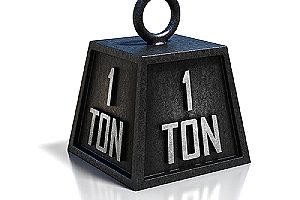 One of the main raw materials used in construction, crushed stone is considered one of the most accessible natural resources on our planet. Its great abundance means it is widely available and relatively inexpensive, and it enjoys widespread use across a range of purposes.
One of the main raw materials used in construction, crushed stone is considered one of the most accessible natural resources on our planet. Its great abundance means it is widely available and relatively inexpensive, and it enjoys widespread use across a range of purposes.
What Is #57 Stone?
When you are seeking crushed stone for a project, you may be surprised by the number of choices available. The size is the most important consideration when narrowing down your options, and there is one type that is suited to a wide range of projects: #57 stone.
The number refers to the size of the pieces, which are created by using a #57 stone. This type of gravel is roughly 1 to 1 1/2 inches in size, or approximately the same size as quarters and nickels. It boasts an angular shape that allows it to lock in place, yet its relatively small size means that it can be moved with ease when necessary.
#57 stone can be made out of a variety of rock types, including trap rock, granite, limestone, quartzite, marble, lava and argillite. Limestone is the most common type of rock used for #57 stone in the United States, although many other types are also readily available.
This type of stone is prized for its versatility. It can be used for a variety of different purposes throughout a property in construction and landscaping. One of its best properties is excellent drainage, making it perfect for preventing flooding and pooling around landscaping features that need to be watered frequently or in areas that experience heavy rains. Water simply percolates through the stones and channels away from wet areas, making it a wise choice for septic drainage fields and French drains.
Moreover, #57 stone is heavy enough to serve as a base for constructing driveways and asphalt roads. In fact, it is used so frequently for driveways that it is sometimes simply referred to as “driveway gravel”.
It can also be placed underneath small structures such as sheds, landscape walls and patios. Tar and other aggregates in hot mix asphalt can sink in between the spaces between the rocks to create a very solid layer of material. It can also be used to surface unpaved gravel driveways and roads, although it is best reserved for flat areas as rock sliding may occur if it is used on steep hills or areas with deep slopes.
In addition, this type of stone is often used by utilities to line sewers and underground pipes.
Factors That May Impact The Total Cost Of #57 Stone
 #57 stone is known for being a very affordable material overall. However, it is important to keep in mind that this is a broad category of material and there are several factors that can influence its specific price.
#57 stone is known for being a very affordable material overall. However, it is important to keep in mind that this is a broad category of material and there are several factors that can influence its specific price.
Type
Because the designation #57 refers to the size of the stone rather than the type, there is a wide variety of rock types that can be used to create it, and each will have a different price. Many people choose the rock for their project based on aesthetic considerations, such as the color and finish of the stone. However, it is possible to save money by using the crushed stones that are most common in your region as rare materials tend to have a higher price per ton.
Weight
Crushed stone is sold by weight, so the heavier the stone is, the more you can expect to pay. Online calculators can help you determine how much stone you need to complete your project. You can enter the dimensions of the space in question and the depth needed to get a good estimate of how much of this stone you will need to order. Generally speaking, a ton of #57 stone can cover 150 square feet at a depth of two inches.
Location
Not every type of crushed stone can be found everywhere in the world. The further your stone has to travel to reach its destination, the more expensive it is going to be to transport it to the project site, particularly if you are ordering a large load. That is why it is best to purchase this type of rock from a local business to keep costs down.
How Much Does #57 Cost Per Ton?
 Most prices for #57 rock will be quoted in tons, so it is important to calculate the number of tons you need before ordering so you can compare prices effectively. Providers like Dirt Connections can help you determine the precise amount you need if you are uncertain or your project has an unusual shape.
Most prices for #57 rock will be quoted in tons, so it is important to calculate the number of tons you need before ordering so you can compare prices effectively. Providers like Dirt Connections can help you determine the precise amount you need if you are uncertain or your project has an unusual shape.
The Dirt Connections portal allows you to see how much various amounts of this type of rock might cost. Simply head over to the portal, enter your address and you will be able to view the types of products that are available for delivery to your project location as well as their prices.
In Northern Virginia, you can expect to pay somewhere between $40 and $65 per ton for this type of rock depending on the size of the order. At Dirt Connections, ordering greater amounts of rock allows you to take advantage of bulk discounting.
One truckload of this rock is roughly equal to 10 to 12 cubic yards or 16 tons and may cost around $800, although prices can fluctuate. Dirt Connections currently offers this type of stone in increments of half a truckload. They also offer other types of stones, such as #3 stone and 21A gravel, along with screened and unscreened organic topsoil and fill dirt.
Speak With A Commercial Construction Contractor
If you are interested in learning more about obtaining #57 stone for your home or construction project, get in touch with the commercial construction contractors at Dirt Connections in Northern Virginia. They will be happy to answer any questions you may have about the right stone to use as well as ordering and delivery.










































